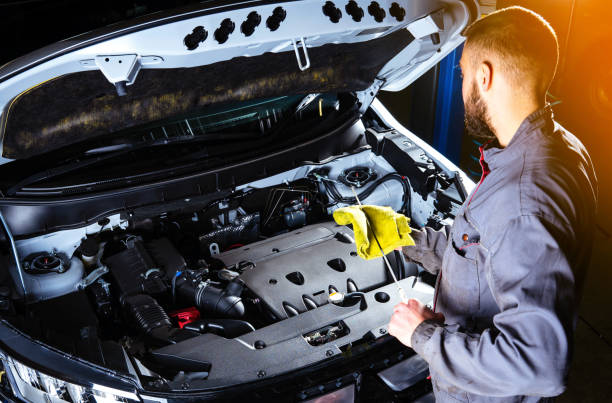Experiencing a getting too hot engine can be demanding, yet how you handle the situation can make all the distinction in stopping major damages. It's important to take instant action to secure your engine and stay clear of pricey repair work if your automobile begins to get too hot. Here's a thorough guide on what to do if your automobile begins to get too hot.
![]()
![]()
Typical Reasons For Getting Too Hot. Several factors can trigger a vehicle to overheat. Understanding the underlying issue can help you prevent future events:
![]()
Reduced Coolant Levels: Coolant is important for regulating the engine temperature level. Leaks, dissipation, or improper upkeep can cause reduced levels. Faulty Thermostat: The thermostat controls the coolant circulation to the engine. If it fails, the engine can overheat. Broken Water Pump: The water pump circulates coolant throughout the engine. If it's malfunctioning, coolant won't move correctly, causing overheating. Radiator Problems: A blocked or harmed radiator can impede coolant circulation, causing an overheated engine. Broken Cooling Fan: The fan helps cool the radiator. If it fails, the engine might overheat, particularly at low speeds or when idling. Exactly How to stop Getting too hot. To stop getting too hot in the future, consider the adhering to maintenance tips:
Frequently Inspect Coolant Levels: Make it a practice to examine the coolant levels and top them off if necessary. Maintain the Cooling System: Flush the radiator and cooling system at intervals advised by your lorry producer. Replace Worn Parts: Make sure that pipes, belts, and the water pump are in excellent problem, as damaged components can cause overheating. Display Temperature level: Always maintain an eye on your temperature level scale, specifically during long drives or heat. By following these steps when your car gets too hot, you can decrease the danger of engine damages and avoid costly repair work. Constantly keep in mind that quick action can help protect your vehicle and guarantee that you remain safe on the road.
- Pull Over and Transform Off the Engine. As quickly as you see that your automobile is overheating-- whether via the temperature level scale reading "HOT" or vapor originating from under the hood-- the first point you ought to do is draw over securely. Remaining to drive when the engine is overheating can cause serious damage to the engine, such as a blown head gasket. As soon as you're securely off the roadway, shut off the engine immediately. This will avoid additional strain on the engine while you analyze the circumstance.

- Let the Engine Cool. After shutting off the engine, wait a minimum of 15 to half an hour to enable it to cool. Opening up the hood while the engine is still hot can cause burns from heavy steam or warm coolant. Utilize this moment to remain tranquil and analyze the circumstance. Bear in mind that getting too hot can be triggered by a variety of aspects, consisting of low coolant, a busted fan, or a malfunctioning thermostat.
- Check the Coolant Level. After including coolant, if the engine seems to be cooling down, you might be able to drive a brief range to a repair service shop. If the coolant degree is typical and the engine still overheats, there's most likely an underlying mechanical concern that needs focus.
- Look for Leakages or Damages. While the engine cools down, evaluate the radiator and tubes for any type of noticeable leakages or damage. A tube that's cracked or a radiator that's dripping can cause coolant to escape, leading to getting too hot. If you find any kind of noticeable damage, prevent driving the cars and truck any further and call for roadside help or a tow vehicle to take your car to the nearby mechanic.

- Reboot the Auto with Caution. If the coolant level is great and you haven't seen any type of noticeable leaks or damages, you may try to restart the vehicle after waiting for the engine to cool. Beginning the automobile and keep an eye on the temperature level scale very closely. If the gauge begins to increase swiftly again, turn off the engine promptly and pull over. It's finest not to continue driving the auto in this case.
Typical Reasons For Getting Too Hot. Several factors can trigger a vehicle to overheat. Understanding the underlying issue can help you prevent future events:

Reduced Coolant Levels: Coolant is important for regulating the engine temperature level. Leaks, dissipation, or improper upkeep can cause reduced levels. Faulty Thermostat: The thermostat controls the coolant circulation to the engine. If it fails, the engine can overheat. Broken Water Pump: The water pump circulates coolant throughout the engine. If it's malfunctioning, coolant won't move correctly, causing overheating. Radiator Problems: A blocked or harmed radiator can impede coolant circulation, causing an overheated engine. Broken Cooling Fan: The fan helps cool the radiator. If it fails, the engine might overheat, particularly at low speeds or when idling. Exactly How to stop Getting too hot. To stop getting too hot in the future, consider the adhering to maintenance tips:
Frequently Inspect Coolant Levels: Make it a practice to examine the coolant levels and top them off if necessary. Maintain the Cooling System: Flush the radiator and cooling system at intervals advised by your lorry producer. Replace Worn Parts: Make sure that pipes, belts, and the water pump are in excellent problem, as damaged components can cause overheating. Display Temperature level: Always maintain an eye on your temperature level scale, specifically during long drives or heat. By following these steps when your car gets too hot, you can decrease the danger of engine damages and avoid costly repair work. Constantly keep in mind that quick action can help protect your vehicle and guarantee that you remain safe on the road.
Navigation
Home
Latest Posts
Genuine Mitsubishi Parts at Basil Mitsubishi
Published May 27, 25
1 min read
Embrace Journey with the Mazda CX-50
Published May 24, 25
2 min read
Welcome Journey with the Mazda CX-50
Published May 24, 25
2 min read